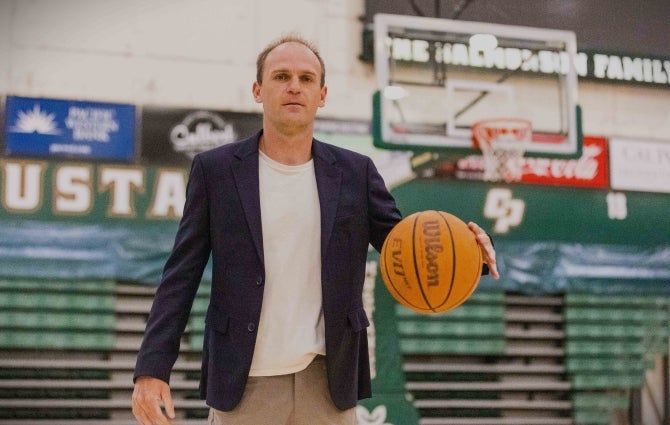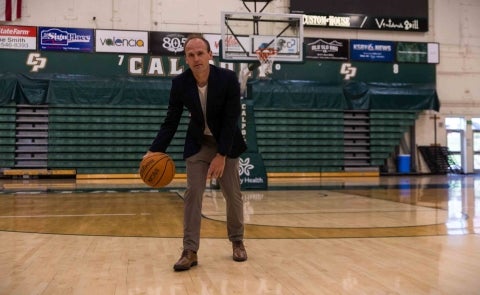Cal Poly Economics Professor Says Stats Can Help Build the Next NBA Champions

Contact: Pat Pemberton
805-235-0555; ppembert@calpoly.edu
SAN LUIS OBISPO, California — Using detailed statistical models, Joseph Kuehn, an associate professor of economics at Cal Poly’s Orfalea College of Business, says many NBA teams have it all wrong when it comes to building winners.
Basketball executives spend big money on individual offensive production instead of building a team with players who complement each other, he wrote in a research paper highlighted on ESPN.
“This creates an asymmetry between player incentives and the team objective,” he wrote in “Accounting for Complementary Skill Sets When Evaluating NBA Players’ Values to a Specific Team.”

As the Boston Celtics attempt to win their 18th title during the NBA Finals this week, academics such as Kuehn could help other NBA teams achieve postseason glory.
Within the study of economics is a growing field called sports economics. While economics and basketball require completely different skills, professional sports teams are increasingly using economics as a strategic edge to win games.
“Sports analytics is growing,” Kuehn said. “Almost every team and every major sport is using it to some degree. It is used in things like player evaluation but also health. That’s a big thing now: Can you try to prevent player injury?”
Kuehn decided to study the NBA about 10 years ago because the data had been collected, but not much work had been done with it yet, unlike baseball, which had a lot of research.
The 2011 film “Moneyball” and the 2003 book “Moneyball: The Art of Winning an Unfair Game” showed the power of data and analytics in sports. Sabermetrics (sometimes known colloquially as moneyball), the empirical analysis of baseball using statistics that measure in-game activity, was applied to the 2002 limited-budget Oakland Athletics baseball team, and its famous late-season 20-game win streak and first-place finish in the American League West with a record of 103-59. This led to challenging the status quo and paved the way for broader acceptance.
“Baseball, they had all the data, they’ve already done that the Moneyball thing,” Kuehn said. “They kind of, I wouldn't say, figured it out, but it had been at least a well-trodden area — where basketball had collected the data, there was interest, but not a bunch of work had yet been done on it.”
Kuehn’s research has been cited on well-known sports websites such as ESPN and The Athletic. ESPN highlighted the eight finalists for the MIT Sloan Sports Analytics Conference's research paper of the year in 2016, and Kuehn’s paper on complimentary skill sets was a final-eight pick.
He was mentioned in an article on The Athletic when they were discussing the highlights of the MIT Sloan Sports Analytics Conference. Kuehn spoke at the conference and was recognized in the article for his research on Chicago Bulls’ players.
Aside from team performance, economics also helps cities determine if taxpayers should fund new stadiums.
“There’s been a lot of economic research that teams actually don’t provide too much of an economic value to their local area,” Kuehn said.

“Even very recently, five to 10 years ago, teams were getting public financing from the cities to build their stadiums,” he said. “There’s been a lot of economic research that teams actually don’t provide too much of an economic value to their local communities — so that’s kind of led to pushback.
“We saw this in Oakland, with the A’s organization, which really wanted the city to pony up some money for a stadium, and the city was kind of like, ‘Well, there’s a lot of economic analysis here that says that adding a stadium is not going to revitalize the area in the way that you’re kind of presenting it.’ That’s put more back onto the owners that if they want these new stadiums, they’re going to have to pay for it rather than use taxpayer money.”
Kuehn primarily focuses on the idea of measuring complementarities between players.
“That’s kind of the initial metric that I built in grad school, which is based around this idea that players are like a collection of skills,” he said. “And if you can measure the complementarities between different skills, then you can measure the complementarities between different players.”
He is currently focused on two studies regarding professional basketball.
“Are NBA teams able to evaluate talent when you have a player like Stephen Curry, who played at Davidson College, where they had players that complimented his skill set because they weren’t ball-dominant?” he asked. “Can you evaluate that compared to somebody who's played at Duke University, where there are more ball-dominant players? You’re not gonna be able to assess their skills individually.”
Kuehn is also investigating why the 15 NBA Western Conference teams have been consistently better over the last 20-25 years than their Eastern Conference counterparts. Specifically, he wants to examine whether it is a snowball effect that builds upon itself.
“They don’t have to pay as much money to acquire talent to still get to the same level in the playoffs,” he said. “You kind of get these initial differences, which really start to snowball and exacerbate until you get this very strong difference between the conferences that we see now.”
Top photo: Joseph Kuehn, an associate professor of economics at Cal Poly’s Orfalea College of Business, has been cited on ESPN and The Athletic, a subscription sports website of the New York Times, for his work analyzing what it takes to build a winning NBA team. Says Kuehn: “Sports analytics is growing. Almost every team and every major sport is using it to some degree. It is used in things like player evaluation but also health. That’s a big thing now: Can you try to prevent player injury?”
Photos by Cal Poly | Pat Pemberton



